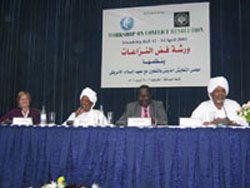The Institute conducted its second conflict resolution training workshop for Sudanese participants April 12-14, 2005, in Khartoum, Sudan. Jacki Wilson of the Professional Training Program was augmented by former Institute Training Program Officer Greg Noone for this workshop, which was conducted in partnership with the Sudan Inter-Religious Council (SIRC).
The Institute conducted its second conflict resolution training workshop for Sudanese participants April 12-14, 2005, in Khartoum, Sudan. Jacki Wilson of the Professional Training Program was augmented by former Institute Training Program Officer Greg Noone for this workshop, which was conducted in partnership with the Sudan Inter-Religious Council (SIRC).
The workshop objectives were to increase trust and understanding among various elements of Sudanese society, to improve participants' conflict resolution skills, and to invigorate a Sudanese "peace network" that crosses sectoral, religious, ethnic, and geographic boundaries.
Participants reflected broad representation among political parties as well as civil society groups, NGOs, and religious and tribal leaders. Women's groups, youth groups, trade unions, and media were also represented. Geographically, participants represented North, South, and West Darfur states, West, North, and South Kordofan, Red Sea, Kassala, and Blue Nile states in addition to Khartoum and Omdurman in the capital region.
This workshop showed that participants in a highly traditional society and culture were open to new training and negotiation techniques. Through guest presentations, the new skills taught were linked to traditional conflict resolution mechanisms as well as conflict resolution traditions in Islam and Christianity. The participants appreciated the trainers showing respect for the conflict resolution techniques already in use while providing new techniques and skills that could complement or supplement these existing mechanisms.



